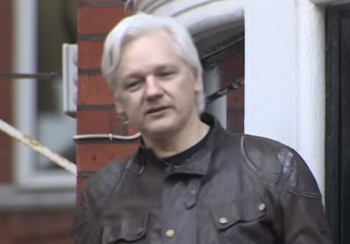Assange in very poor health, needs treatment, says WikiLeaks lawyer
WikiLeaks publisher Julian Assange is in extremely poor health and unless he is released from the Ecuadorian embassy in London, his condition may deteriorate to the point where his life is threatened.
Australian lawyer Greg Barns, a member of Assange's legal team and an adviser to WikiLeaks, told iTWire in response to queries that Assange had not been able to access medical treatment for six years.
This was because the UK Government had refused to allow to leave the embassy for medical appointments without being arrested.
"This is a cruel and inhumane stance from a government professing to be a liberal democracy," Barns said. As iTWire has reported, the Australian journalists' union, the Media, Entertainment and Arts Alliance, appears to have nothing to say about Assange's plight.
Reports in July said that Ecuador President Lenin Moreno had either finalised, or was about to finalise, an agreement with the UK to end asylum protection for Assange. But nothing has eventuated since then.
Ecuador has blocked Assange from using the Internet since the end of March, after he criticised alleged human rights abuses by Spain at the time when Catalonia launched protests for independence.
Assange, who holds both Australian and Ecuadorian citizenship, has been taking refuge in the Ecuadorian embassy in London since June 2012.
Said Barns: "In fact, what is remarkable is that Julian remains so mentally alert and is able to function physically given the inevitable impact of six years detention without natural light or access to fresh air on a constant basis.
"However if there is not a resolution to his case — in other words, the UK guaranteeing that he will not be extradited to the US — the reality is Julian's health will deteriorate to the point where his life is in serious danger."
Assange's problems began when he visited Sweden in August 2010 to attend a conference where he was scheduled to give a talk. During that visit, he had sex with two women whom he met. The pair filed rape and molestation complaints against him later, claims that he denied.
He was questioned by Swedish authorities and cleared. He could have left the country then and there, but stayed for a while, in case the authorities decided to question him again.
Interpol issued a Red Notice for his arrest on 20 November 2010. On 27 November, Assange surrendered to authorities and appeared before a Westminster judge. He was granted bail in December after his backers provided £240,000 in cash and sureties.
A legal back and forth eventuated and went on until June 2012, when Swedish prosecutors sought his extradition.
Assange's lawyers, among them the world-renowned Australian Geoffrey Robertson, replied that if he agreed to the extradition request, then he could be flown to the US from there.
On 19 June 2012, he jumped bail and took refuge in the Ecuadorian embassy, seeking asylum in the South American country. British police surrounded the building and blocked any chance of his leaving.
Ecuador granted him asylum in August 2012. He has had to stay inside the four walls of the embassy since then. He was granted Ecuadorian citizenship by a former president of the country, Rafael Correa.
https://www.itwire.com/strategy/84366-assange-in-very-poor-health,-needs-treatment,-says-wikileaks-lawyer.html


0 Comments:
Post a Comment
Subscribe to Post Comments [Atom]
<< Home